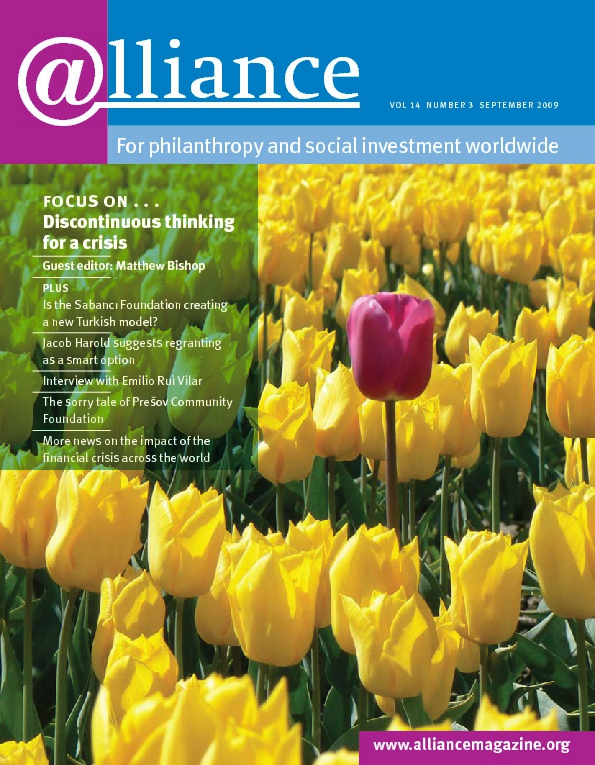A seven year-old girl named Olivia took her life savings, $35, and donated it to the Bill and Melinda Gates Foundation. Was Olivia naive to increase the Gates Foundation’s endowment by 0.0000001 per cent? Or does her generous act offer us insight into a new philanthropic model?
 In 2008, unsolicited gifts to the Gates Foundation totalled $10.4 million. Warren Buffett’s 2006 decision to give $40 billion to the Gates Foundation justifiably made greater headlines than these smaller donations – and not just because of all of the zeroes involved. Buffett made his fortune by picking good managers and investing in them. ‘What can be more logical,’ he said, ‘in whatever you want done, than finding someone better equipped than you are to do it? Who wouldn’t select Tiger Woods to take his place in a high-stakes golf game?’ His choice was, in essence, an act of humility: Buffett did not believe that he had the knowledge or expertise to make good philanthropic decisions. Instead, he searched for a grantmaker he trusted to act on his behalf.
In 2008, unsolicited gifts to the Gates Foundation totalled $10.4 million. Warren Buffett’s 2006 decision to give $40 billion to the Gates Foundation justifiably made greater headlines than these smaller donations – and not just because of all of the zeroes involved. Buffett made his fortune by picking good managers and investing in them. ‘What can be more logical,’ he said, ‘in whatever you want done, than finding someone better equipped than you are to do it? Who wouldn’t select Tiger Woods to take his place in a high-stakes golf game?’ His choice was, in essence, an act of humility: Buffett did not believe that he had the knowledge or expertise to make good philanthropic decisions. Instead, he searched for a grantmaker he trusted to act on his behalf.
For my own modest philanthropy, I could spend months researching which US-based organization does the best work serving at-risk youth. Or I could simply write a cheque to the Edna McConnell Clark Foundation, widely celebrated for the rigorous process it uses to pick youth development organizations with proven results. It is very likely that they would make a better decision than I ever could. And so my money would do a better job helping kids. This is the essence of regranting.
Regranting is no new phenomenon. Organizations like United Way have been regranting for decades. In recent years, a new wave of groups like Global Fund for Women, TrustAfrica and Global Greengrants have added further options for the donor who cares more about making an impact on an issue or a region than about having final say on a particular grant. Now, regranting is ripe for expansion.
In the US alone, there are over 97,000 foundations and grantmaking public charities. About 5,000 of them have paid staff. Like all institutions, they vary in effectiveness. But in that group are some superb professionals – people with decades of experience on the world’s most complex social issues, who are plugged into vast networks that include the best of the old and the new, the North and the South. They are not necessarily smarter, but they are better positioned to make philanthropic decisions than an average donor – no matter how brilliant that donor may be in her day job as a teacher or doctor or cabinetmaker.
In fact, it is not easy for donors to outsource their giving. How can someone who wants to support gay and lesbian rights know that the Gill Foundation is a highly strategic donor focused in that area? Here again, we see the need for better information infrastructure in philanthropy. Non-profits need to systematically share their goals, strategies and results – and so should donors. If we are to embrace the humble, impact-oriented ethos of regranting, we need good information on which to base decisions. US foundations are required by law to publicly disclose their grants, but disclosure is not enough: donors also need tools and products to make information usable and regranting easy.
For example, a ‘side-by-side fund’ could allow a donor to mimic the giving of one programme area of a particular foundation. Like an index fund, it would distribute dollars in proportion to another portfolio, in this case a foundation programme area. Or donors could skip the middleman altogether if they could easily find out where and why institutional givers gave their money. Organizations including Nonprofit Knowledge Network, Partners for Change and Root Cause are working to design such products. If successful, they could bring a new form of external accountability to foundations: donors could ‘vote’ for which regranter they trust the most. And as more information about impact becomes available, these votes could go beyond reputation to be an informed, crowdsourced judgement about foundations’ actual results.
Most individual donors are not yet inclined to give up control of their giving. But with better information and more convenience they just might. Every year, millions of people give up control of their financial investments to professionals. Outsourcing to professionals is just another form of control: you pick the person or the institution instead of feeling overwhelmed by the choices before you.
Information infrastructure can yield benefits to democracy: stronger voices; and benefits to social impact: better choices. Olivia gave her $35 to thoughtful professionals whom she trusted. She was commended for being generous; Olivia also deserves credit for being smart.
Jacob Harold is Philanthropy Program Officer at the Hewlett Foundation. Email JHarold@hewlett.org



Comments (0)